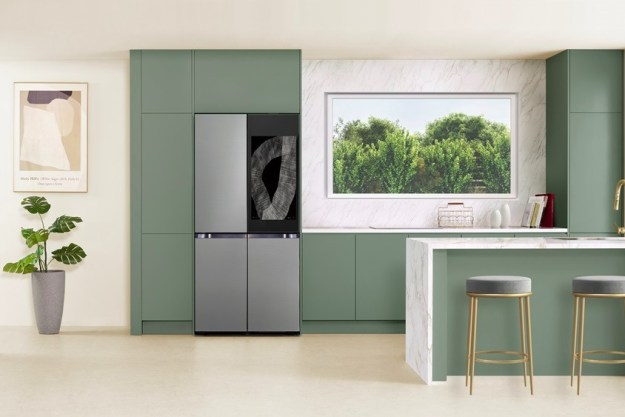Back in August of 2018, Samsung announced a plan to join the smart speaker world with the Samsung Galaxy Home. However, after numerous delays and missed release dates, the Samsung Galaxy Home is dead.
Samsung has removed the “coming soon” page for the Samsung Galaxy Home (it disappeared sometime in early February). It now links to the company’s landing page for its various smart home devices. The only remnant for the Galaxy Home’s existence is an outdated page that simply explains what the device might do.
We reached out to Samsung for comment, but a representative declined to share an update or future plans for the device’s release.
In an increasingly crowded smart speaker market, the Galaxy Home would find it difficult for to make a name for itself. Amazon and Google have widened the gap between themselves and all competitors, to the point that catching up might just be futile. Even Apple’s HomePod struggled on release.
Bixby wouldn’t be enough
The core of any smart speaker is, naturally, the assistant. Both Alexa and Google Assistant have been improved and upgraded far beyond their original versions. Both are incredibly powerful with widespread functionality, well beyond what Siri offers.
Samsung’s Bixby lacks the same versatility of the other voice assistants, which has led many to question whether the smart assistant would be useful enough to warrant a dedicated speaker.
For example, Bixby only recognizes a few languages including English, Korean, and Mandarin. Both Amazon Alexa and
To Samsung’s credit, the company has built up a robust portfolio of gadgets that support its SmartThings smart home platform. The Samsung Galaxy Home would be central to bridging
Digital Trends spoke with Mark Benson, Head of Engineering for Samsung’s SmartThings, who provided some insights on SmartThings’ priorities. “Our strategy from the beginning has been obsessively centered on the experience of the user,” said Benson. “Hardware, I believe, will fade into the fabric of our connected lives and users will focus less and less on the devices, the gadgets, the hardware, but more on the experiences that they enable.”
Was development hindered by the pandemic?
Samsung, like all companies, has tighten its operations in response to the Covid-19 pandemic. The Galaxy Home could be a casualty. Even though the company reported an increase in operating profit for the first three months of 2020, it’s expected to post a decline for the April-June quarter due to the pandemic.
When you factor in the company’s response for the ongoing pandemic, as well as the shift in consumer spending, it could all be affecting the Samsung Galaxy Home’s continued development. Releasing the Samsung Galaxy Home during a time of uncertainty would be foolish.
This leads to the possibility (however small) that the Samsung Galaxy Home has been placed on the back burner and still has a hope of seeing release.
A new smart speaker needs to be exceptional
The smart speaker market is defined by Google Home and Amazon Echo. That isn’t to say there is no room for more smart speakers; quite the opposite, in fact. The market would benefit from competition driving innovation. However, any newcomer to the market needs to be absolutely exceptional.
The Samsung Galaxy Home needs to be more than just a great smart speaker. There are a lot of elements that will play into its success, including its aesthetic appeal, sound quality, and the power of its assistant. At present,
If Samsung takes this time to improve upon its speaker and come into the market with a smart device that can truly compete with the leaders, then the company should capitalize on the opportunity.
Unfortunately, it now seems far more likely that the Galaxy Home is dead in the water after too many delays.
Editors' Recommendations
- SimpliSafe is now using AI to prevent burglars from entering your home
- Google rolls out new Nest Cam features to Google Home for web
- Daisy is an installation and repair company designed for your smart home
- Samsung Ballie is a rolling smart home hub with a built-in projector
- Kohler reveals luxurious smart home products that turn your bathroom into a spa




